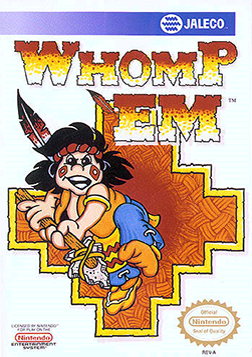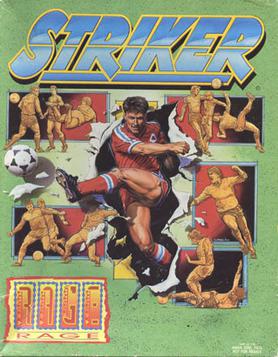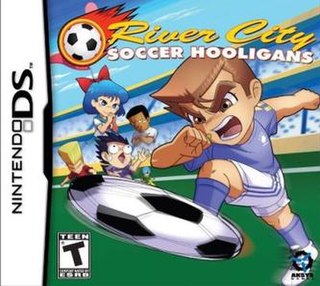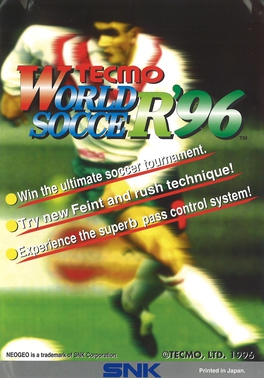
Antonio Michael "Tony" Meola is an American former professional soccer player who played as a goalkeeper. He represented the United States national team at the 1990, 1994, and 2002 World Cups. From 1996 to 2006, he played in Major League Soccer, the U.S. top soccer division, where he obtained multiple honors. Meola is currently a radio host on SiriusXM FC.

Whomp 'Em, the North American version of the Japanese game Saiyūki World 2: Tenjōkai no Majin (1990), is a platform game released on the Nintendo Entertainment System in March 1991. It is named after Wampum.

Striker is a soccer video game series first released by Rage Software in 1992.

Super Soccer, known in Japan as Super Formation Soccer (スーパーフォーメーションサッカー), is a football (soccer) video game developed by Human Entertainment for the Super NES. Human published the game by themselves in Japan whereas Nintendo did it overseas. It was released in Japan in 1991 and in the United States and Europe in 1992. It was on the Super NES launch lineup in Europe, due to the sport's popularity. In 2017, it was rereleased in Japan as part of the Japanese Super NES Classic Edition. The game has also been included in the SNES app available for Nintendo Switch Online subscribers.

International Superstar Soccer 64 is a video game developed by Konami Computer Entertainment Osaka in the International Superstar Soccer series by Konami. Its team lineup follows the Super NES version of International Superstar Soccer Deluxe, only with South Africa replacing Morocco.

Ruy Ramos, formerly Ruy Gonçalves Ramos Sobrinho until he obtained Japanese citizenship, is a former football player and manager, originally from Brazil, who spent his career in Japan and played for the Japan national team as a midfielder. Ramos is currently active as a television personality and tarento, represented with Irving.
Pack-In-Video Co., Ltd. was a Japanese video game publisher and video distributor. The games published were mostly focused on the Japanese market although a few titles have been published abroad. In October 1996, the company was merged with the video game division of Victor Entertainment and became Victor Interactive Software.

International Superstar Soccer, known as Jikkyō World Soccer Perfect Eleven in Japan, is a football video game developed by Konami for the Super Nintendo Entertainment System. It is the first title in the International Superstar Soccer (ISS) series of sports video games. The game sold over 500,000 copies.

Super Goal! 2, known in Japan as Takeda Nobuhiro no Super Cup Soccer is an international soccer video game published by Jaleco for the Super NES/Super Famicom console.

Zico Soccer from Electronic Arts is a Super Famicom football management video game that allows players to become the head coach of an international football team; it was named after the Brazilian midfielder Zico, who at the time was playing for Japanese team Kashima Antlers. The game is mostly in the Japanese language although some words are in the English language.

Super Formation Soccer 94: World Cup Edition is the third release of the original Super Formation Soccer video game, which was made specially for the 1994 FIFA World Cup.

International Superstar Soccer Pro 98 is a football video game which follows International Superstar Soccer Pro developed by Konami Computer Entertainment Tokyo. The Japanese version was re-released in late 1998 as Winning Eleven 3: Final Version with some slight improvements, such as a wider camera option. In Japan, a version of the game featuring only J-League clubs was released in December 1998 titled J-League Jikkyō Winning Eleven '98-'99.

Sega Worldwide Soccer '98, known in North America as simply Worldwide Soccer '98 and in Europe as Sega Worldwide Soccer '98 Club Edition, is a video game developed and published by Sega for the Sega Saturn in 1997 and Windows in 1998 only in Japan and in 1999 in North America as Worldwide Soccer Championship. It is the third game in its series, following Victory Goal and Sega Worldwide Soccer 97.

Pro Evolution Soccer, often abbreviated as PES and also known as World Soccer: Winning Eleven 5 in Japan, is a football sports simulation video game released in 2001. It is the first installment of Konami's Pro Evolution Soccer series.

River City Soccer Hooligans is a sports game for the Nintendo DS. It was developed by Avit-Niigata, and published by Arc System Works in Japan on May 27, 2010, and in North America, published by Aksys Games on June 10. This was the last Kunio-kun game for the Nintendo DS, as starting with Nekketsu Kōha Kunio-Kun Special handheld entries in the series were released for the Nintendo 3DS instead.

Pro Evolution Soccer 2012 is a video game which is the eleventh edition in the Pro Evolution Soccer series developed and published by Konami. Lionel Messi, who was the cover star for the series since PES 2009, was replaced by PES 2008 cover star Cristiano Ronaldo, while Borussia Dortmund player Shinji Kagawa replaces Messi as the cover star for the Japanese release. The US and Latin American cover features Santos player Neymar and Cristiano Ronaldo.

Soccer Brawl is a futuristic soccer game first released in arcades on February 14, 1992. It was available on the Neo Geo on March 13 the same year and later for the Neo Geo CD on March 31, 1995.

Tecmo World Soccer '96 is a football video game developed by Tecmo for the Neo Geo arcade console, published in 1996. This video game is part of the Tecmo World Cup series.

Osmar Shigeru "Ozu" Moreira is a beach soccer player who plays as a defender.

Super Sidekicks 3: The Next Glory is a 1995 soccer arcade video game developed and published by SNK. It is the third installment in the Super Sidekicks series, succeeding Super Sidekicks 2: The World Championship (1994). Featuring an arcade-style approach to soccer like its predecessors, the game allows players to choose any of the available game modes to compete with AI-controlled rivals or other human players with their preferred team. Though first launched for the MVS hardware, the title was ported for Neo Geo AES and Neo Geo CD, in addition of being re-released through compilations and download services for various consoles. It proved popular among players and garnered positive reception from critics, however most reviewers noted that it felt more an update than a true successor to Super Sidekicks 2. It was followed by The Ultimate 11: SNK Football Championship in 1996.




















